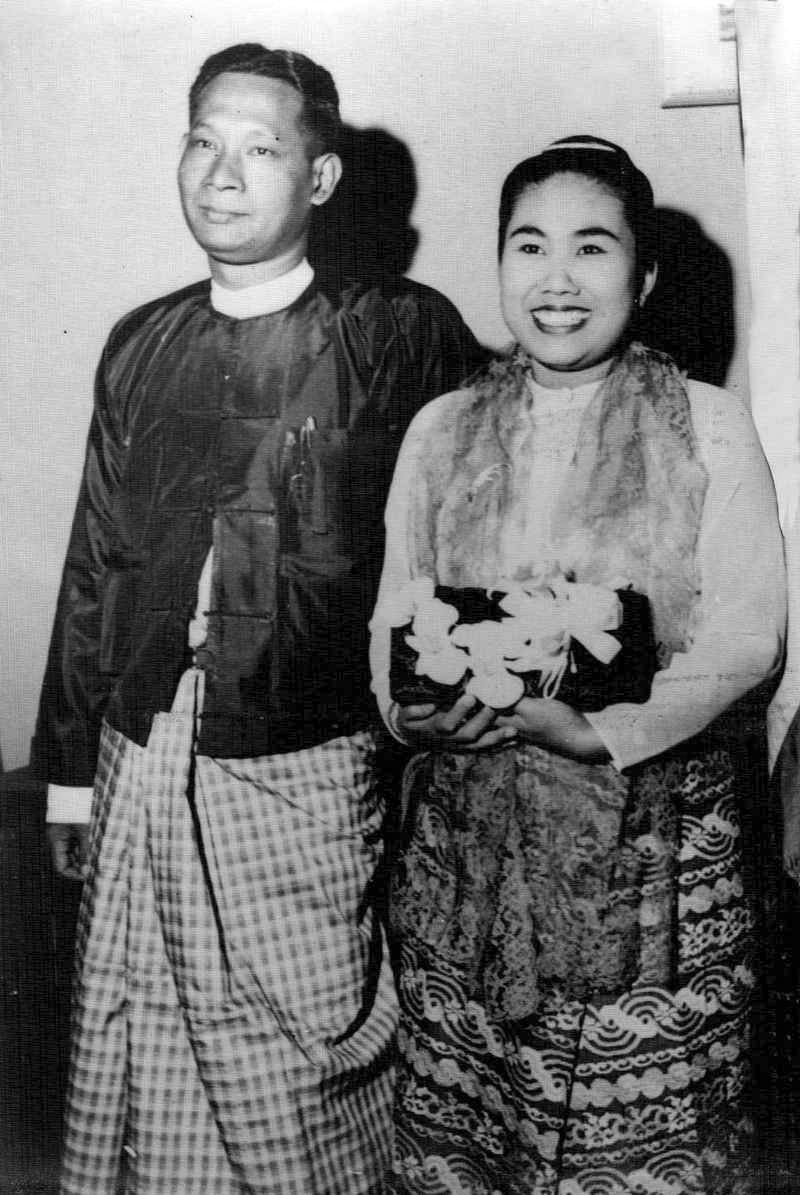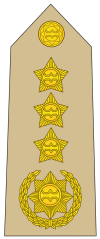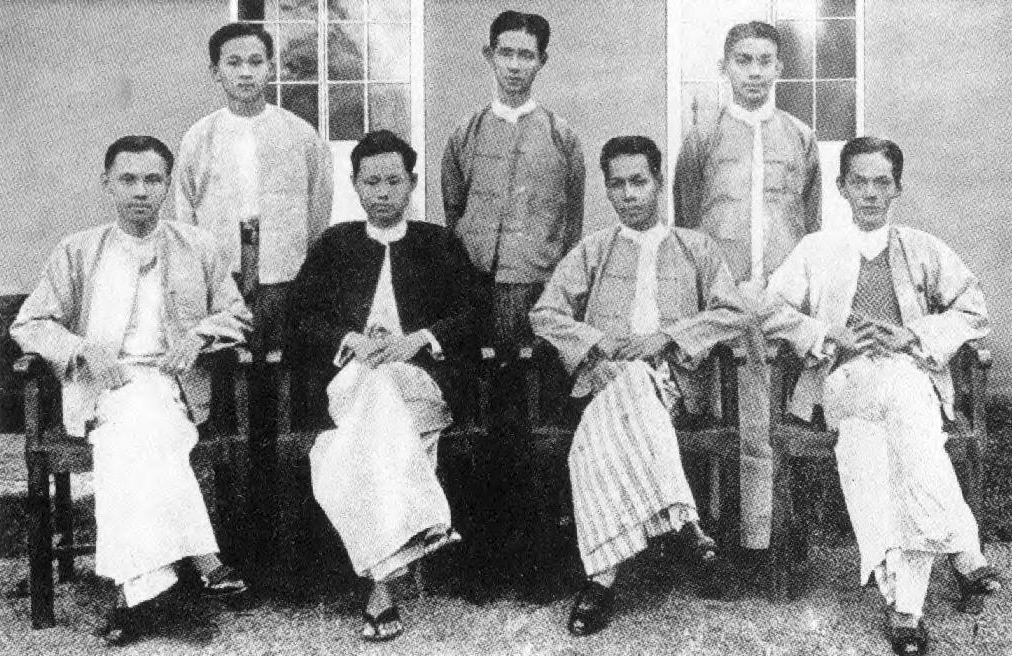|
Burma Socialist Party
The Burma Socialist Party (), initially known as the People's Freedom (Socialist) Party or PF(S)P, was a political party in Burma. It was the dominant party in Burmese politics after 1948, and the dominant political force inside the Anti-Fascist People's Freedom League (AFPFL - ).Win, Kyaw Zaw. A history of the Burma Socialist Party (1930-1964)' Because of its inclusion in AFPFL, it was colloquially known as (''AF Social''). The party was a successor to the wartime People's Revolutionary Party and founded by Ba Swe, Kyaw Nyein and five others in order to counter the influence of the Communist Party of Burma within the AFPFL and to prevent a communist take-over of the umbrella organization.Rose, Saul. ''Socialism in Southern Asia''. London: Oxford University Press, 1959. p. 106 For the same reason, to counter the communist All Burma Trade Union Congress, the socialists also launched the Trade Union Congress (Burma) in November 1945. Before the foundation of the PF(S)P, the comm ... [...More Info...] [...Related Items...] OR: [Wikipedia] [Google] [Baidu] |
Ba Swe
Ba Swe ( my, ဘဆွေ, ; 17 October 1915 – 6 December 1987) was the second Prime Minister of Burma. He was a leading Burmese politician during the decade after the country gained its independence from Britain in 1948. He held the position of prime minister from 12 June 1956 to 28 February 1957. When Ba Swe became prime minister, ''Time'' magazine reported the news in an article titled: 'The Day of the Tiger' based on his nickname 'Big Tiger' (''Kyah gyi'' Ba Swe) since his university days in the 1930s as a student leader. His name was often paired with the name of another famous student leader as Ba Hein and Ba Swe, both ''Thakins'' or members of the nationalist '' Dobama Asiayone'' (We Burmans Association) and were arrested by the British colonial government during the year of countrywide protests, demonstrations and strikes in 1938 known as the "1300 Revolution" (''Htaung thoun ya byei ayeidawbon'' named after the Burmese calendar year). Ba Hein became a founder member ... [...More Info...] [...Related Items...] OR: [Wikipedia] [Google] [Baidu] |
Thakin Mya
Dobama Asiayone ( my, တို့ဗမာအစည်းအရုံး, ''Dóbăma Ăsì-Ăyòun'', meaning ''We Burmans Association'', DAA), commonly known as the Thakhins ( my, သခင် ''sa.hkang'', lit. Lords), was a Burmese nationalist group formed around the 1930s and composed of young, disgruntled intellectuals. Drawing their name from the way in which the British were addressed during colonial times, the party was established by Ba Thaung in May 1930, bringing together traditionalist Buddhist nationalist elements and fresh political ideals. It was significant in stirring up political consciousness in Burma, and drew most of its support base from students. The party's song, ''Myanmar Kaba Ma Kyei'' ("Till The End of the World, Burma") also became the country's first national song and eventually its national anthem. Composed by Saya Tin (later known as "Thakhin Tin"), the song was a national symbol during the Japanese occupation of Burma and was adopted in 1948 upo ... [...More Info...] [...Related Items...] OR: [Wikipedia] [Google] [Baidu] |
Political Parties Disestablished In 1964
Politics (from , ) is the set of activities that are associated with making decisions in groups, or other forms of power relations among individuals, such as the distribution of resources or status. The branch of social science that studies politics and government is referred to as political science. It may be used positively in the context of a "political solution" which is compromising and nonviolent, or descriptively as "the art or science of government", but also often carries a negative connotation.. The concept has been defined in various ways, and different approaches have fundamentally differing views on whether it should be used extensively or limitedly, empirically or normatively, and on whether conflict or co-operation is more essential to it. A variety of methods are deployed in politics, which include promoting one's own political views among people, negotiation with other political subjects, making laws, and exercising internal and external force, including ... [...More Info...] [...Related Items...] OR: [Wikipedia] [Google] [Baidu] |
Defunct Political Parties In Myanmar
{{Disambiguation ...
Defunct (no longer in use or active) may refer to: * ''Defunct'' (video game), 2014 * Zombie process or defunct process, in Unix-like operating systems See also * * :Former entities * End-of-life product * Obsolescence Obsolescence is the state of being which occurs when an object, service, or practice is no longer maintained or required even though it may still be in good working order. It usually happens when something that is more efficient or less risky r ... [...More Info...] [...Related Items...] OR: [Wikipedia] [Google] [Baidu] |
Burma In World War II
Myanmar, ; UK pronunciations: US pronunciations incl. . Note: Wikipedia's IPA conventions require indicating /r/ even in British English although only some British English speakers pronounce r at the end of syllables. As John C. Wells, John Wells explains, the English spellings of both Myanmar and Burma assume a non-rhotic variety of English, in which the letter r before a consonant or finally serves merely to indicate a long vowel: [ˈmjænmɑː, ˈbɜːmə]. So the pronunciation of the last syllable of Myanmar as [mɑːr] or of Burma as [bɜːrmə] by some speakers in the UK and most speakers in North America is in fact a spelling pronunciation based on a misunderstanding of non-rhotic spelling conventions. The final ''r'' in ''Myanmar'' was not intended for pronunciation and is there to ensure that the final a is pronounced with the broad a, broad ''ah'' () in "father". If the Burmese name my, မြန်မာ, label=none were spelled "Myanma" in English, this would b ... [...More Info...] [...Related Items...] OR: [Wikipedia] [Google] [Baidu] |
1964 Disestablishments In Burma
Events January * January 1 – The Federation of Rhodesia and Nyasaland is dissolved. * January 5 - In the first meeting between leaders of the Roman Catholic and Orthodox churches since the fifteenth century, Pope Paul VI and Patriarch Athenagoras I of Constantinople meet in Jerusalem. * January 6 – A British firm, the Leyland Motors, Leyland Motor Corp., announces the sale of 450 buses to the Cuban government, challenging the United States blockade of Cuba. * January 9 – ''Martyrs' Day (Panama), Martyrs' Day'': Armed clashes between United States troops and Panamanian civilians in the Panama Canal Zone precipitate a major international crisis, resulting in the deaths of 21 Panamanians and 4 U.S. soldiers. * January 11 – United States Surgeon General Luther Terry reports that smoking may be hazardous to one's health (the first such statement from the U.S. government). * January 12 ** Zanzibar Revolution: The predominantly Arab government of Zanzibar is overthrown b ... [...More Info...] [...Related Items...] OR: [Wikipedia] [Google] [Baidu] |
1945 Establishments In Burma
1945 marked the end of World War II and the fall of Nazi Germany and the Empire of Japan. It is also the only year in which nuclear weapons have been used in combat. Events Below, the events of World War II have the "WWII" prefix. January * January 1 – WWII: ** Germany begins Operation Bodenplatte, an attempt by the ''Luftwaffe'' to cripple Allied air forces in the Low Countries. ** Chenogne massacre: German prisoners are allegedly killed by American forces near the village of Chenogne, Belgium. * January 6 – WWII: A German offensive recaptures Esztergom, Hungary from the Russians. * January 12 – WWII: The Soviet Union begins the Vistula–Oder Offensive in Eastern Europe, against the German Army. * January 13 – WWII: The Soviet Union begins the East Prussian Offensive, to eliminate German forces in East Prussia. * January 16 – WWII: Adolf Hitler takes residence in the ''Führerbunker'' in Berlin. * January 17 ** WWII: The Soviet Union occupies Warsaw, Polan ... [...More Info...] [...Related Items...] OR: [Wikipedia] [Google] [Baidu] |
Ne Win
Ne Win ( my, နေဝင်း ; 10 July 1910, or 14 or 24 May 1911 – 5 December 2002) was a Burmese politician and military commander who served as Prime Minister of Burma from 1958 to 1960 and 1962 to 1974, and also President of Burma from 1962 to 1981. Ne Win was Burma's military dictator during the Socialist Burma period of 1962 to 1988. Ne Win founded the Burma Socialist Programme Party (BSPP) and overthrew the democratic Union Parliament of U Nu in the 1962 Burmese coup d'état, establishing Burma as a one-party socialist state under the Burmese Way to Socialism ideology. Ne Win was Burma's ''de facto'' leader as chairman of the BSPP, serving in various official titles as part of his military government, and was known by his supporters as U Ne Win. His rule was characterized by a non-aligned foreign policy, isolationism, one-party rule, economic stagnation and superstition. Ne Win resigned in July 1988 in response to the 8888 Uprising that overthrew the BSPP, ... [...More Info...] [...Related Items...] OR: [Wikipedia] [Google] [Baidu] |
Union Revolutionary Council
The Union Revolutionary Council ( my, နိုင်ငံတော်တော်လှန်ရေးကောင်စီ), officially the Revolutionary Council of the Union of Burma ( my, ပြည်ထောင်စုမြန်မာနိုင်ငံတော်လှန်ရေးကောင်စီ) or simply the Revolutionary Council (RC; my, တော်လှန်ရေးကောင်စီ), was the supreme governing body of Burma (now Myanmar) from 2 March 1962, following the overthrow of U Nu's civilian government, to 3 March 1974, with the promulgation of the 1974 Constitution of Burma and transfer of power to the Pyithu Hluttaw (People's Assembly), the country's new unicameral legislature. The Revolutionary Council's philosophical framework was laid in the Burmese Way to Socialism, which aspired to convert Burma into a self-sustaining democratic socialist state, on 30 April 1962. On 4 July 1962, the RC established the Burma Socialist Programme Pa ... [...More Info...] [...Related Items...] OR: [Wikipedia] [Google] [Baidu] |
Burma Workers And Peasants Party
The Burma Workers Party, until 1958 the Burma Workers and Peasants Party, was a communist party in Burma, formed on 8 December 1950 by leftist elements of the Socialist Party. In December 1962 it merged with the People's Comrade Party to form the United Workers Party. In March 1964, it was among the many parties banned by decree of the Revolutionary Council.Bečka, Jan (1995) "Burma Workers' and Peasants' Party (BWPP)" ''Historical Dictionary of Myanmar'' Scarecrow Press, Metuchen, New Jersey, p. 55, History The founders of the BWPP were 42 leading cadres of the Socialist Party, who denounced the leadership of Ba Swe and Kyaw Nyein. These included Thakin Chit Maung, Thakin Hla Kywe, Thakin Lwin and U Ba Nyein. Within the Socialist Party discussions had emerged on issues like the affiliation of the Trade Union Congress (Burma) to the World Federation of Trade Unions. Under the leadership of Thakin Lwin, the TUC(B) had steered towards an openly communist line. In the May ... [...More Info...] [...Related Items...] OR: [Wikipedia] [Google] [Baidu] |
Aung San
Aung San (, ; 13 February 191519 July 1947) was a Burmese politician, independence activist and revolutionary. He was instrumental in Myanmar's struggle for independence from British rule, but he was assassinated just six months before his goal was realized. Aung San is considered the founder of modern-day Myanmar and the Tatmadaw (the country's armed forces), and is commonly referred to by the titles "Father of the Nation", "Father of Independence", and "Father of the Tatmadaw". Devoted to ending British Colonial rule in Burma, Aung San founded or was closely associated with many Burmese political groups and movements and explored various schools of political thought throughout his life. He was a life-long anti-imperialist and studied socialism as a student. In his first year of university he was elected to the executive committee of the Rangoon University Students' Union and served as the editor of its newspaper. He joined the Thakin Society in 1938 and served as its gener ... [...More Info...] [...Related Items...] OR: [Wikipedia] [Google] [Baidu] |
Kyaw Zaw
Kyaw Zaw ( my, ကျော်ဇော, ; 3 December 1919 – 10 October 2012) was one of the founders of the Tatmadaw (the modern Burmese Army) and a member of the legendary "Thirty Comrades" who trained in Japan in the struggle for independence from Britain. He was also one of the leaders of the Communist Party of Burma, and had lived in exile in Yunnan Province, China, since 1989 after retiring from politics. Student activist Born Maung Shwe in a village called Hsaisu near Thonze in Tharrawaddy District, British Burma, Kyaw Zaw was educated in the traditional manner, mainly in monastic schools often becoming a novice monk during the Buddhist lent, until the final year when he went to the Pazundaung Municipal High School in Rangoon. There he met teachers who were members of the nationalist ''Dobama Asiayone'' (We Burmans Association) who made him become politically aware and soon joined the ''Yè tat'' (The Braves - ''Dobama'' militia). As he was educated only in the ve ... [...More Info...] [...Related Items...] OR: [Wikipedia] [Google] [Baidu] |






